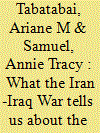| Srl | Item |
| 1 |
ID:
154361


|
|
|
|
|
| Summary/Abstract |
The Islamic State in Iraq and Syria (ISIS)'s activities now go beyond insurgency and conventional operations in the territories it controls in the Middle East. It poses a threat to U.S. interests and allies in Europe, and a serious threat to Iran and its borders. While Washington formed an international coalition encompassing many European and Middle Eastern states to combat ISIS, it only coordinates some tactical and operation-level efforts with a key player on the ground: Iran. For its part, Iran is leveraging similar counter-ISIS tools as those adopted by the United States, despite their strategies differing fundamentally.
|
|
|
|
|
|
|
|
|
|
|
|
|
|
|
|
| 2 |
ID:
158008


|
|
|
|
|
| Summary/Abstract |
Iran’s support for terrorist groups is the subject of countless articles and monographs. Less emphasis is placed on Tehran’s efforts to fight terrorist groups targeting the Iranian state. Yet, modern domestic and foreign terrorist groups have targeted Iran for decades. As a result, the country has developed fairly sophisticated, albeit opaque, counterterrorism apparatus and mechanisms. This article sheds light on the Iranian counterterrorism apparatus and efforts since the 1979 Islamic Revolution, drawing on several years of fieldwork in Iran, interviews with current and former officials, and Persian sources.
|
|
|
|
|
|
|
|
|
|
|
|
|
|
|
|
| 3 |
ID:
153633


|
|
|
|
|
| Summary/Abstract |
The 1980–88 Iran-Iraq War stands as the pivotal event for Iran's national security strategy, especially as it pertains to the country's controversial nuclear program. The “imposed war,” as it is known to Iranians, caused Iran to view itself as isolated and on the defensive, striving for self-reliance and survival in what it continues to perceive as an unjust international order. The war has shaped both Iran's strategic outlook generally and its nuclear policies specifically. It was a decisive factor in determining the nature and scope of Iran's nuclear activities, as well as in Iran's approach to the international negotiations surrounding those activities, which in 2015 produced the Joint Comprehensive Plan of Action. Both during those talks and after the implementation of the deal began, Iranian decisionmakers regularly invoked the history and lessons of the war to construe their decisionmaking process and define their bottom lines. Yet the war and its implications for Iran's strategic culture and nuclear thinking remain understudied and misunderstood. If the implementation of the deal and a longer-term resolution of the conflict over Iran's nuclear program are to succeed, the history of the Iran-Iraq War and the vital lessons that Iran has drawn from it must be appreciated.
|
|
|
|
|
|
|
|
|
|
|
|
|
|
|
|